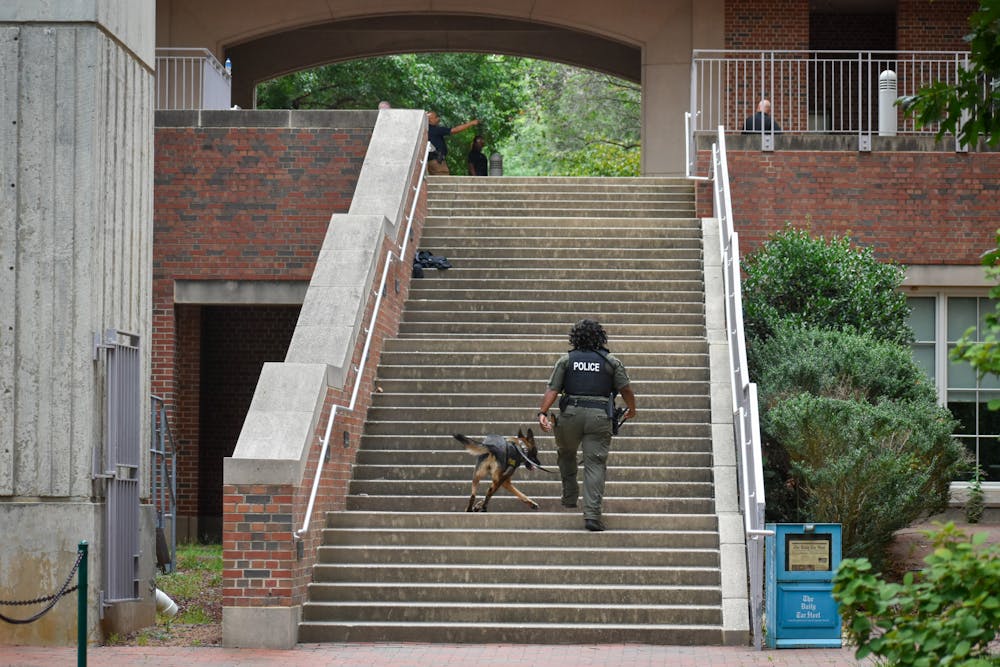In a news release on July 31, University Communications wrote a function to send messages in Spanish, as well as English, is "in the works."
UNC Director of Emergency Management and Planning Darrell Jeter said that he doesn't have a timeline for when the language changes will be implemented.
"There's not one entity that can solve all the problems"
Orange County Emergency Services Director Kirby Saunders said that OC Alerts, Orange County’s public alert and warning system, is currently being reviewed for messaging linguistics and working towards increased efficiency. He said that this overhaul process was underway before the shooting, and they are working diligently to make these alerts available in multiple languages.
“Our goal is to try to improve equity and accessibility for public learning more for the whole community, and so that requires us to translate messages and build all of that out,” Saunders said. “So that work is kind of deep and underway right now.”
On-campus departments work with surrounding organizations, including the Chapel Hill Police Department and Orange County Emergency Services. Saunders said the shooting incident prompted multiple campus partners, including law enforcement agencies, Emergency Medical Services and their Emergency Management Division to coordinate and respond.
“There’s not one entity that can solve all the problems,” Saunders said. “We believe in a collaborative partnership in our community that includes both traditional response agencies, but also the media and the public at large — and definitely the student body, as well.”
Amy Orders, the senior director of emergency preparedness and strategic initiatives at NC State University, said in a statement that the universities regularly compare best practices and approaches.
“Our teams have open dialogue and can provide support, both in person or with other resources, depending on the impacting situations,” Orders wrote.
In the spring, N.C. State implemented recurring campus-wide emergency communications drills.
Faculty Training
The University announced in July that they now offer an online emergency preparedness module for faculty that includes four sections: Be Informed, Be Prepared, Take Action and Other Incidents.
To get the day's news and headlines in your inbox each morning, sign up for our email newsletters.
In a statement to The Daily Tar Heel, UNC Media Relations wrote that the 25-minute training repackages safety information available online and is specifically designed for instructors.
Jeter said that as of Aug. 16, 83 percent of UNC faculty had indicated and attested to completing the training.
"When the provost announced that training to our faculty, it was strongly encouraged that they complete that training, and the expectation is that they would complete that before the start of class, because students look to them as leaders in the classroom to provide guidance in the event of an emergency," Jeter said.
Distinguished Professor of Biology Victoria Bautch said that faculty received multiple emails strongly encouraging them to complete modules. She said that the emails came from various administrators on campus in the last couple weeks before classes started.
Bautch, who had been at UNC before the shooting, said she only remembered one instance of her department bringing in people to discuss safety. After the shooting, she thought students were pretty upset and had trouble focusing in class.
"If out in the hallway there'd be like a thump or something, you know, a couple people might jump a little bit," she said.
In the weeks following Aug. 28, 2023, a petition was created to argue for comprehensive protocols outlining how to respond to active shooter situations on campus. The petition's first demand was for stronger faculty training. The petition received 1,495 signatures.
After completing the training, Bautch said she addressed safety procedures in class, including how to lock the doors in Wilson Hall, and asked which students are trained to help in case of an emergency.
"They encouraged us to talk about it," she said, in reference to University communication.
Surveillance on Campus
Law enforcement was present on Polk Place during the "Triangle Gaza Solidarity Encampment" and following protests on April 30, where pro-Palestinian demonstrators removed the American flag from its flagpole and replaced it with the Palestinian flag.
Saunders said Orange County Emergency Services was not directly involved in any decision-making or the events that occurred during the encampment, but the County Emergency Operations Center was activated and EMS resources were on standby.
“Our posture, from the county’s perspective, was to relay and be in a position to provide support to the campus community and the town of Chapel Hill,” Saunders said.
An Orange County Emergency Services trailer camera was requested by the UNC Office of Emergency Management on Aug. 5, delivered on Aug. 16 and returned on Aug. 26, Sarah Pickhardt, the Orange County division chief of emergency management, wrote in a statement to The DTH.
She wrote that the use and placement of the camera on campus — which was located in front of South Building — would have been at the discretion of the University.
The University was also seen installing security cameras on each corner of South Building on Aug. 29.
During a Board of Trustees meeting on May 13, trustees created and passed a motion to divert $2.3 million budgeted for DEI services to be used for public safety. On May 23, at the Board of Governors meeting that voted to repeal mandatory DEI initiatives at UNC System institution, the UNC Board of Governors said that any savings as a result of changes in DEI policies would be put towards "student success" initiatives.
Lumsden said that Students Demand Action did not advocate for increased surveillance and cameras on campus because it can have negative implications.
“Increased surveillance doesn’t always mean increased safety,” Lumsden said.
Media Relations Manager Erin Spandorf wrote in a statement to The DTH that the University can request assistance from outside agencies and entities as needed.
“For security reasons, we do not release information about security cameras on campus,” Spandorf wrote.
@dailytarheel.com | university@dailytarheel.com



